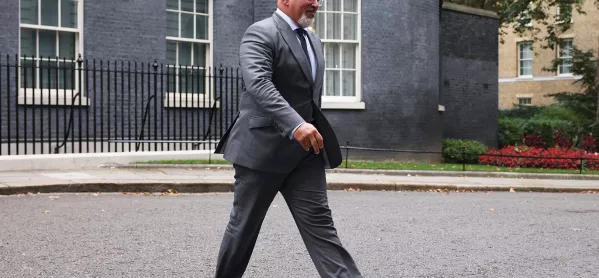Heads demand action from Zahawi on ‘grim’ Covid figures

Headteachers have written to education secretary Nadhim Zahawi to demand that he takes action over “grim” statistics showing that more than 200,000 pupils were off school for Covid-related reasons last week.
Mr Zahawi has previously said the government “won’t stand back and let attendance fall”.
News: More than 200,000 pupils off because of Covid
Zahawi: ‘We won’t let school attendance fall’
News: Schools not asked for Covid attendance data
Covid: 820,000 pupils off school for coronavirus-related reasons
But today headteachers from the Association of School and College Leaders have written demanding that he takes action over the “big increase” in the number of pupils off school.
Covid: ‘Big increase’ in the number of pupils off school
“These grim statistics show a big increase in the number of pupils out of school as a result of the continuing havoc caused by coronavirus,” Geoff Barton, general secretary of the ASCL, said.
“We are hearing from schools where there are 10 per cent or more of pupils absent and where staff are also off work because of the virus.
“Teaching and learning is very difficult in these circumstances and it is clear that the educational disruption of the past 18 months is far from being over.
“The new education secretary, Nadhim Zahawi, recently said that he won’t stand back and let attendance fall because the education of our children is simply too important.
“Now is the time for him to set out exactly what steps he intends to take to back up that statement with practical action to address the current situation. We are writing to him today expressing the urgency of the situation.”
Mr Barton said Mr Zahawi should look at “why it is taking so long to deliver the carbon-dioxide monitors to schools that the government promised at the start of term”.
“Today’s figures emphasise the importance of the vaccination programme for 12- to 15-year-olds. The anti-vaccination campaign that is taking place is extremely unhelpful and we urge parents and students who have any concerns as a result of this campaign to seek out reliable and official sources of information,” he said.
“These vaccinations are an important step in keeping children in the classroom and returning the education system to normality.”
Commenting on the rising Covid absence confirmed in today’s statistics, Paul Whiteman, general secretary of the NAHT school leaders’ union, said: “The latest data on case numbers among school-aged children should be ringing alarm bells for government.
“Put simply, we cannot allow Covid to rage unchecked in schools as it will only lead to more disruption to children’s education.
“Covid and Covid-related absence is still interrupting education for staff and students. We are hearing from members on a daily basis who are still experiencing a high level of disruption.
“Our members are particularly concerned about the current guidance relating to siblings and household contacts. At the moment, if a child tests positive for Covid, their siblings can continue to attend school, even if they share a bedroom, for example. Our members say this is actively contributing to the spread of Covid in schools.”
A Department for Education spokeswoman said: “We are committed to protecting education, which is why the safety measures in place strike a balance between managing transmission risk with regular testing and enhanced ventilation and hygiene, and reducing disruption to face-to-face education.
“We are working with parents and school and college staff to maximise students’ time in the classroom - encouraging uptake of testing and the vaccine for 12 to 15-year-olds, and contracting specialist attendance advisers to work on strategies to improve attendance where problems are identified.”
You need a Tes subscription to read this article
Subscribe now to read this article and get other subscriber-only content:
- Unlimited access to all Tes magazine content
- Exclusive subscriber-only stories
- Award-winning email newsletters
Already a subscriber? Log in
You need a subscription to read this article
Subscribe now to read this article and get other subscriber-only content, including:
- Unlimited access to all Tes magazine content
- Exclusive subscriber-only stories
- Award-winning email newsletters
topics in this article



